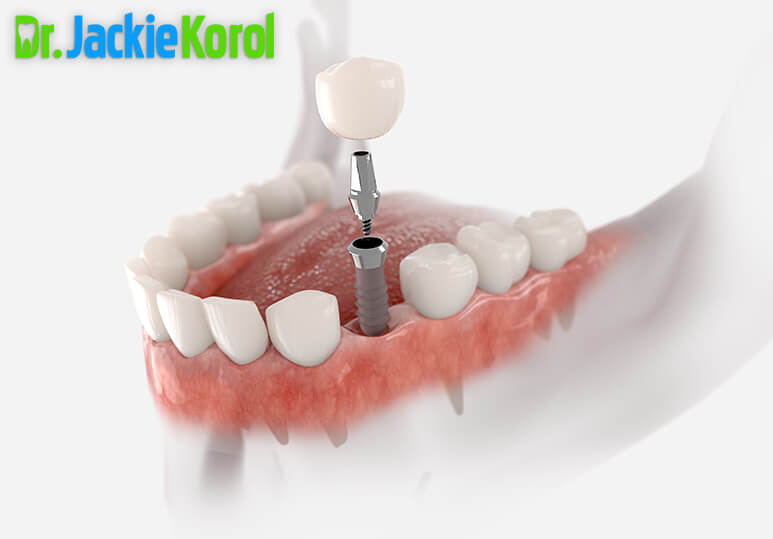How Well Does Your Crown Fit?

A dental crown is a tooth-shaped cap that is placed over a damaged, decaying, or heavily discoloured tooth to restore function and appearance. A mainstay in restorative dentistry, a properly-fitting dental crown can serve its purpose for decades before needing to be replaced.
The fit is key; a dental crown that does not fit your tooth perfectly can be a hazard to your oral health. As such, it is in your interest to recognize the signs of a poorly-fitting crown so that you can get the help of a trusted dentist right away.
Dr. Korol Dental specializes in all forms of restorative dentistry, including in the application of dental crowns and partial crowns. Our commitment to biocompatible dental services means that we only use non-toxic materials that are completely safe to the human body. If you find that your crown is not fitting well and want to have it adjusted or changed to a non-toxic, ceramic alternative, connect with Dr. Korol Dental today.
How To Find Out If Your Crown Fits You
More than just causing discomfort, an ill-fitting crown can lead to:
- Cavities
- Gum diseases
- Cracked teeth
- Joint disorders in the jaw
The problem is that most people cannot tell if their dental crown fits them or not. They may think that the increased discomfort and inconvenience are just par for the course. However, a well-fitting crown should not cause any negative sensation in your jaw. On the contrary, it should blend in seamlessly and restore full function to your teeth.
You can tell that there is something wrong with your crown when:
Your bite has changed: If you feel your dental crown sticking out or applying pressure to the opposite tooth when you close your mouth, your crown could be misfitted. Jaw soreness when you chew is another indication of a poorly-placed crown.
Your crown pressures neighbouring teeth: An excessively wide crown can exert pressure on the teeth next to it. The tension and pain are especially palpable when you attempt to bite, chew or lock your jaw.
You can also tell that your crown is too wide if you have difficulties flossing between it and the neighbouring teeth.
Food gets lodged around the crown: A crown that is too narrow has the opposite problem, as food will easily get stuck around it.
Too much food accumulating around the base of the crown is a telltale sign that your crown is not sized correctly to cover your tooth, and it is yet another sign that your crown is not suited for you.
Your crown is loose: Your crown should not be any looser than any other tooth in your mouth. Have your dentist tighten your crown if it moves around.
The concern, however, is not that a loose crown may fall off. A loose crown allows bacteria and food to get in the gap between it and the tooth it is supposed to protect. This can lead to tooth decay and infection.
Chewing gets painful or difficult: Your crown is supposed to restore the function of your tooth—not making it more bothersome to eat. A crown placed too high may cause pain when chewing as your teeth will be connecting sooner than they should. Conversely, a crown placed too low may not connect with the opposite tooth at all, affecting your ability to chew.
Your gums are damaged: Your crown may be poorly installed if the health of your gums deteriorate soon after getting it. A properly-fitting crown should not negatively affect your gums in any way.
Don't Ignore the Signs
Pay extra attention to potential signs of discomfort after getting a new dental crown. If it is affecting your bite, pressuring other teeth, feeling loose, causing pain, or ruining your gums, your crown may be misplaced.
In the event of a poorly-fitting crown, have it checked by a reputable dentist immediately. A crown that does not fit snugly on your tooth cannot serve its purpose and is a danger to your oral health.
Explore our restorative dental services at Dr. Korol Dental. Our fully biocompatible tooth restoration procedures, combined with our longstanding practise, ensure that our crowns will never harm your oral health. Call 403-245-9099 or fill out the online contact form to book your next crown checkup at Dr. Korol Dental.
FAQs
Q: How much is a ceramic crown?
A: The cost of a ceramic crown depends on the tooth and on the treatment necessary to prepare the tooth. A ceramic crown can cost anywhere between $2,000 to $3,000.
Q: What is a partial crown?
A: A partial crown covers only the surface of the tooth, but not the entire tooth. A partial crown is effective for restoring function to a moderately-damaged tooth.
Q: What is biocompatible dentistry?
A: Dentists practising biocompatible dentistry avoids using harmful and toxic materials such as mercury, fluoride, and certain metals that are often used by other dentists. Biocompatible solutions only use organic products or materials that are otherwise not harmful to the body.
CONTACT US
Questions? Comments? Call us today at 1-403-245-9099 or fill out the form below:


